Page 2 of 7
Re: v694 Mon
Posted: Fri Feb 12, 2016 9:58 pm
by Paolo Berardi
Hi Peter, we are both "synchronized"!

I also observed H-beta line yesterday but I still have to extract the profile. Looking at the 2d spectrum I can see the two absorption of multiplet that you've said (I include only two lines in my spectral interval) further blue shifted and broadened respect to the previous observation (6 Feb).

Lines should be Fe II (42) multiplet, 4924A, 5018A, 5169A.
See you soon,
Paolo
Re: v694 Mon
Posted: Sat Feb 13, 2016 5:43 pm
by Francois Teyssier
Dear all,
I've updated the database with your spectra (just missing Unberto's one)
The current ouburst rivals in luminosity the one of 1990

- V694Mon.PNG (15.61 KiB) Viewed 8922 times
Iijima's classification refers to the velocity of the jet.
In 2011, March, I got profiles of types C/D, with maximal velocity of about 7000 km/s (!)
I see that it was during the decline of the outburst :
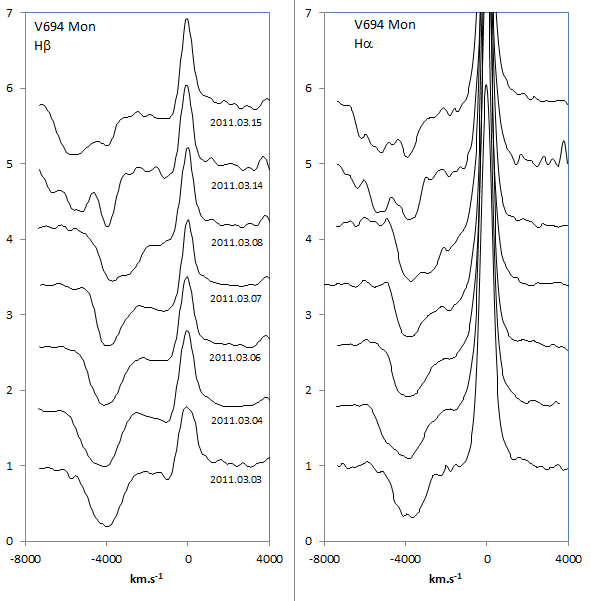 http://www.astronomie-amateur.fr/feuill ... 94Mon.html
http://www.astronomie-amateur.fr/feuill ... 94Mon.html
Of course, ongoing observations are welcome. The detection of a plateau between emission and absorption = an ATel
Note : the absorption looks to a P Cygni profile but isn't : a P Cygni profile is formed by scaterring in a continuous wind so the absorption can't be detached as it is sometimes the case for V694 Mon. The absorption is formed in the jet (wich is in our line of sight - like a blazar, for instance BL Lac)
"The structure of the lines differs distinctively from classicalP Cygniline profilesfor a stellar wind. Compared to stellar winds, there is a lack of absorption at low velocities pointing to an outflow geometry, where the acceleration region is not in front of the dominating radiation source. The maximum outflow speed of−6000 kms−1 exceedsalsothe speedof novaejecta byabouta factor oftwo and is far beyond velocities observed in any other symbiotic system. Also the strong variability in the absorption structure is indicative that the mass outflow differs completely from a radiatively driven stellar wind" (Schmid & al., 2001)
The lines are Fe II (42).
Identification of number of lines in Schmid (2001)
Evolution of H alpha absorption from 2015-12-31 (Peter Somogyi) to 2016-01-21 (Tim Lester)
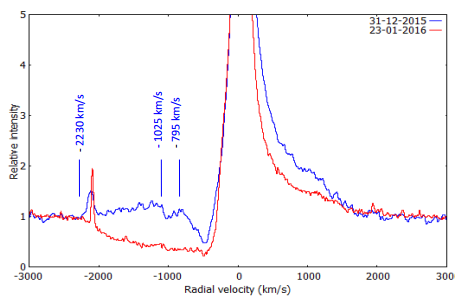
- V694Mon_Comp.PNG (26.5 KiB) Viewed 8747 times
All the best,
François
Re: v694 Mon
Posted: Sat Feb 13, 2016 6:13 pm
by Paolo Berardi
Hi François, thank you for information and clarification about profile type.
I reduced my last spectra (11 feb). The integrated profile (seven subexposures of 960s each):

Changes between H-beta profiles in terms of radial velocity:

I placed an arrow where I think there is the maximum velocity (~2800 Km/s). Red side of H-beta absorption is raising and blue side is gaining velocity.
The same comparison for two lines of the multiplet 42 (it confirms what Peter observed).

Finally, I tried to animate the subexposure profiles (6 frames are used) including the photometry I took simultaneously (V band):

Paolo
Re: v694 Mon
Posted: Sat Feb 13, 2016 6:42 pm
by Francois Teyssier
Great Paolo !
Looks like the plateau is now been created, type B, with a part of the red slope which the same than blue slope.
We need more spectra !
Re: v694 Mon
Posted: Sat Feb 13, 2016 8:28 pm
by Peter Somogyi
Still on 2016/02/11, swapped activity with Paolo - now I was who went through a few Balmer lines (lower res: R~2000/red - 1000/blue, LHires/600pmm/35um):
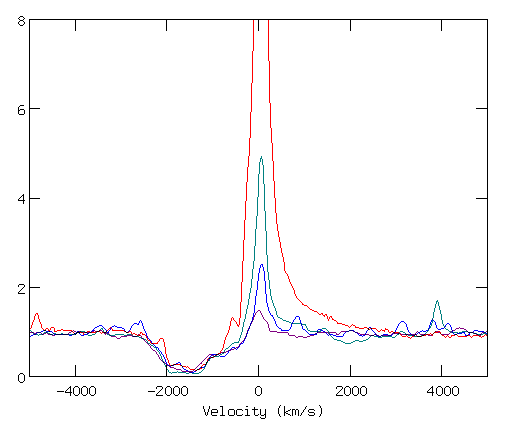
- v694Mon_lhires.png (11.31 KiB) Viewed 8898 times
red: H-alpha: v694mon_20160211_861
cyan: H-beta: v694mon_20160211_884
blue: H-gamma: v694mon_20160211_921 (focused on)
purple: H-delta: asdb_v694mon_20160211_921 (defocused part)
(all scaled to continuum=1)
Cheers,
Peter
Re: v694 Mon
Posted: Sun Feb 14, 2016 10:55 am
by Francois Teyssier
Dear all,
There's some issues with the atmosphéric response.
Not easy due to low altitude of the star, low density of reference stars and great interstellar absortion in the region.
For an altitude of 30° a difference of 5° between the target and the star produces
Here's a model of the error for a target obtained at an altitude = 25° and target at 30° (AOD = 15)
15% of error at lambda = 4000 (for a spectrum normalized at 6500 angströms)
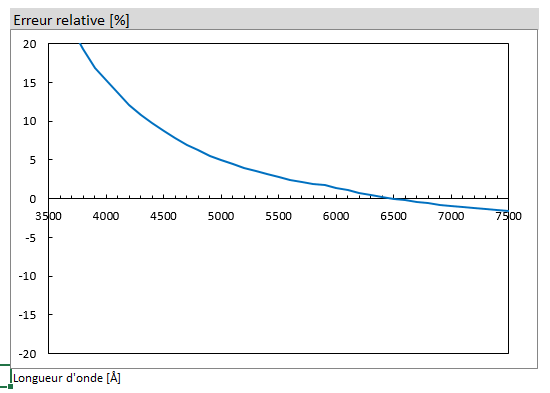
- error.PNG (8.68 KiB) Viewed 8882 times
We need to define a common protocole.
Could you describe 1. the reference star you used 2. the protocole (UT time, duration of acquisition for reference and target).
Here's two proposal, using the faint HD149147 and delta Mon
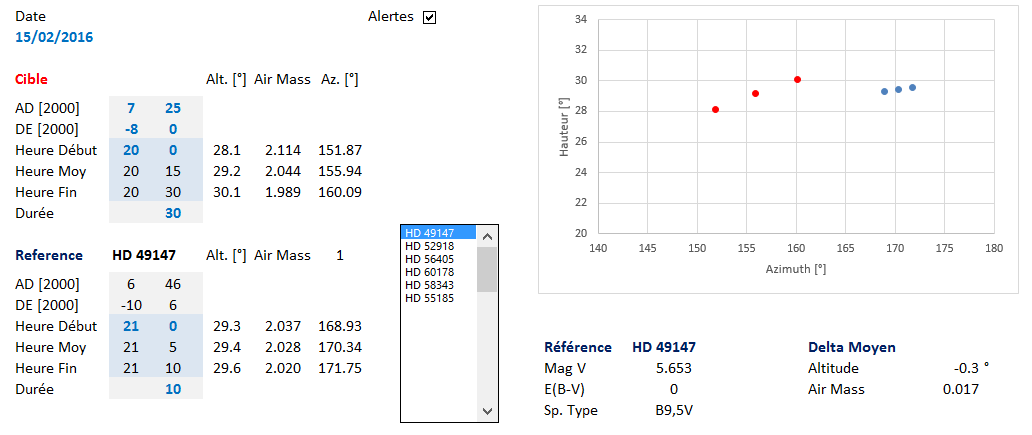
- V694Mon_Ref1.PNG (30.96 KiB) Viewed 8882 times
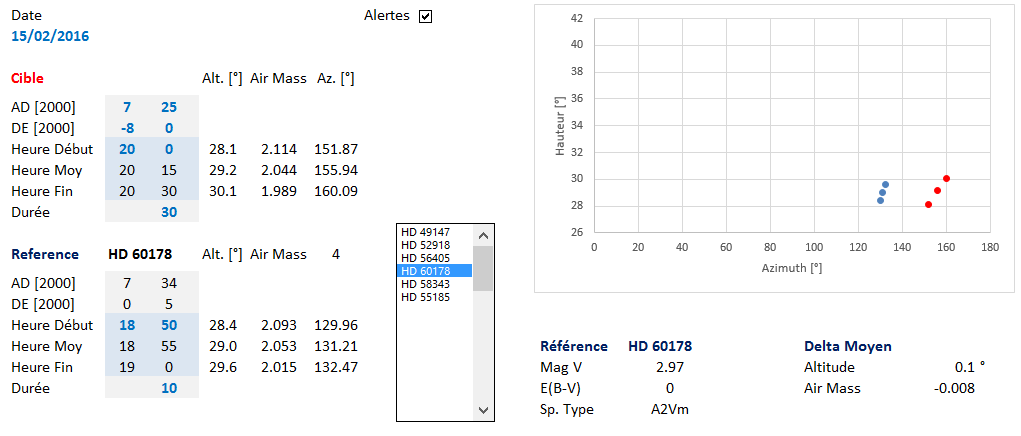
- V694Mon_Ref2.PNG (30.51 KiB) Viewed 8882 times
Delta Mon requires a long time between the two acquisitions
Link to reference star finder :
http://www.astronomie-amateur.fr/Docume ... inder.xlsm
To be discussed
All the best,
François
Bad weather here
I hope I'll be able a acquire a spectrum at the begining of the week, according to the forecasts
Re: v694 Mon
Posted: Mon Feb 15, 2016 7:30 am
by Paolo Berardi
Hi François, I also think it's important to adopt the same reference star.
For my observations I used HD065900 (A1V) but was is not close to the target. I tried to compensate the delta altitude with the atmospheric transmission curves ratio.
HD49147 you propose seems very good. If its E(B-V) value is close to zero (I can see in your spreadsheet) we could use NOAO spectra in the ISIS library. There are two profiles B9.5V, HD79469 and HD 100889 (the stars should also be not reddened). They match well:

For mid-res observations (Lhires III 1200) I would like to avoid Pickles and Miles spectra, the Indo-U.S. Library seems better.
Paolo
PS: the second ref star you showed is Castor B
Re: v694 Mon
Posted: Mon Feb 15, 2016 9:09 am
by Peter Somogyi
Francois,
I was using Del Mon, taken before & after with their average. Even if this method is not as perfect as catching the right moment when to shoot the stars (I've found it's not possible in practice at all), but at least giving reliable result allowing to recalculate it to v694 Mon's position (the 2nd ref.star is needless here for this recalculation). This reestimation possible to do this re-assessment using the fits header's DATE_OBS + exp.time/(24*3600)/)2 and geographical location. So all the necessary info are in the header. If you need, I can send you a text table picking these values out.
If I was an astronomer, I would do it for all database results here, it's such a common calculation if you want to do the things as accurate as possible.
Of course, I will use the newly recommended star later on.
All the best,
Peter
Re: v694 Mon
Posted: Mon Feb 15, 2016 3:58 pm
by umberto sollecchia
Bonjour à tous,dans mon observation, comme une référence, j'utilisé l'étoile HD065900 , mais pas en étant proche de le target, j'essayé de compenser la différence de hauteur en appliquant une courbe de réponse atmosphérique calculée par le programme ISIS.
Cependant, dans l'avenir pour obtenir le même continu, il serait approprié, comment le dit Farncois, utilisez la même étoile de référence.
Cordialement Umberto
Re: v694 Mon
Posted: Mon Feb 15, 2016 6:15 pm
by Francois Teyssier
Sorry for HD 60178 ! It is the only error in the table of 1000 stars ...
The issue is fixed. I reload the spreadsheet.
The correction with ISIS is a good method, but it requires the evaluation of the AOD (needs two references at two different altitudes)
Peter : yes, but the header doesn't save the reference star neither its acquisition time (it is a important improvment for the data base, I hope that Chistian will be soon able to buit it)
François







